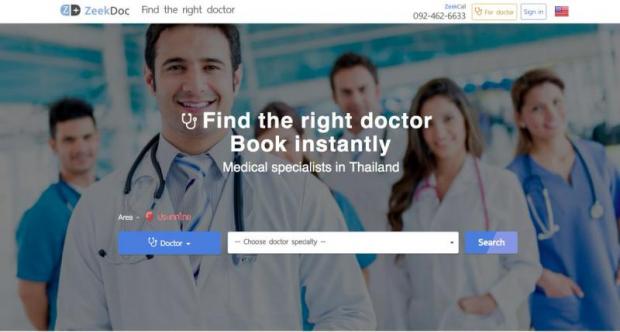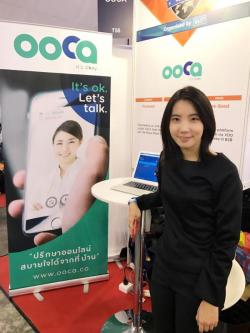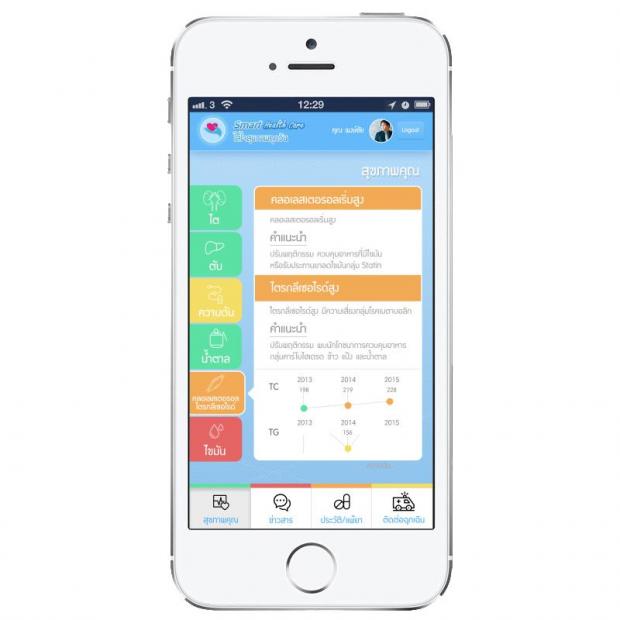
The newest wave of tech startups in Thailand are health tech entrepreneurs -- working on innovative services designed to change the face of healthcare and solve problems traditional caregivers avoid.
Online psychological consultation
Online video psychologist consulting service OOca.co was founded by Kanpassorn Suriyasangpetch while she studied dentistry.
"Back then I was stressed and found it's hard to access a psychologist, so I designed a platform to bridge patients with psychologists," said Ms Kanpassorn, general manager of OOca.co.
Thais are unfamiliar with the concept of seeing psychologists, so OOca attempts to make patients feel comfortable with the practice. OOca's data and security systems are designed to comply with the standards of the US' Health Insurance Portability and Accountability Act.
"Our service allows users to choose a doctor and a schedule according to their preferences, with varying consulting fees," she said.

OOca.co general manager Kanpassorn Suriyasangpetch has created a platform to bridge the gap between patients and psychologists.
Users are required to register their name, gender and age. Real names are not necessary if users are concerned about privacy, and they can choose from a pool of certified physicians and psychiatrists. The consulting service will be conducted via the OOca app on desktops or mobile phones, with a minimum consultation of 15 minutes. Users can check the psychologists' background and credentials.
After one month of operations, OOca.co has hosted some 900 sessions, with most callers being middle-aged females, largely seeking help with their marriages or graduate degrees. This online service is suitable for pre-medical consulting and users can have repeat sessions with a single psychologist in order to keep track of progress and symptoms.
"The online consulting service could be available to the masses if the government introduces a clear policy supporting telemedical services and adds online psychologists to the Universal Coverage Health Scheme [UCS] and social security card," Ms Kanpassorn said, noting that by merging with the UCS, online consulting enables many people who cannot afford consultation access to the service.
The doctor-to-patient ratio in developed countries is 1:10,000, while in Thailand it is 1:400,000. The online service is a helpful alternative for the shortage of physicians.
OOca also plans to raise funds by the end of this year to further expand its marketing.
Online health consulting
Chiiwii LIVE co-founder Piraya Tamrongterakul said public healthcare services in Thailand are primarily limited to cities. Patients wait a long time to get an appointment, while the cost of private hospital services is prohibitive.
Women are concerned not only for themselves but also for their loved ones. Their concerns include sexually-related problems, hormones, pregnancy, infertility, skin, cosmetics and health, to name a few. The bulk of women are mothers who work full time. They toggle between being successful in their careers and being wives and mothers. The roles they play sometimes become a barrier to maintaining their health.
Ms Piraya developed the Chiiwii LIVE mobile application to offer healthcare services for women. Chiiwii LIVE offers real-time teleconsultation services focused on solving minor health issues women encounter in their daily lives, said Ms Piraya.
The platform charges consultation fees. "Our ultimate goal is to provide accessible health consultation in the most efficient way," she said.
On Chiiwii LIVE, healthcare providers are certified medical doctors and practising nurses. Users are able to get real-time consultations with their preferred specialist on their smartphones (iOS and Android) whenever and wherever they want via chat, voice call, and video call.
In the near future, there will be a Q&A webboard moderated by a team of medical specialists, co-founders of the application who perceive the pitfalls of misleading online health information.
The webboard also acts as an archive for health information, creating a space for those who have similar problems to share their thoughts and experiences. There are over 30 volunteer physicians on board with Chiiwii.com who share the mutual goal of providing reliable health information to the public.
Find your neighbourhood doctor
Walaiphan Chanmithkul built the Zeekdoc.com website to help people find doctors and hospitals via the internet. They can check schedules and make appointments online or over the phone.
"We have found there is a shortage of physicians in Thailand, and it's very hard to locate a convenient hospital and access the work schedule of doctors," said Ms Walaiphan, co-founder of Zeekdoc.com and a committee member of the Thai Health Tech Association.
Zeekdoc.com saves patients from having to commute to hospitals, as there are not sufficient numbers of doctors in rural areas to take care of patients in their localities. The website also links health insurance plans with the hospitals that accept them.
It has a database of around 2,000 physicians, covering private hospitals in Bangkok and Chon Buri provinces. There have been 200,000 visits to the website and more than 1,200 appointments in six months.
By the end of August, the company will expand to include 20,000 clinics nationwide. Zeekdoc will enable clinics to provide online appointments.
The company offers online reservation services to clinics via Software as a service on either a monthly and annual basis. The system allows doctors to update their schedules in real time to circumvent disappointment from patients if doctors are not available for routine schedules.
Zeekdoc plans to partner with a firm specialising in artificial intelligence to allow patients to input data for a preliminary self-diagnosis to help them choose their doctor's speciality.
In other countries there are similar apps to Zeekdoc, such as ZocDoc in the US and DocDoc across Southeast Asia. "Zeekdoc is unique in that our database dives into the sub-specialities of physicians, which is useful for patients," said Ms Walaiphan.
She said health tech startups need support from the Public Health Ministry and policymakers to encourage the use of digital technology among health workers, reducing their workload and making them more willing to embrace new technology.
"In some countries, startups in the health tech industry take five times longer than the global average to establish themselves because of security and safety concerns as well as compliance," said Ms Walaiphan.
Mobile health records
SmartHealthCare Global was founded by Phongchai Petsanghan, his wife Dr Kitima Setboonsang, and programmer partners who specialise in machine learning. They developed the SmartHealthCare mobile application to store and report mobile health records.
"We aim to provide social enterprise services by presenting health check results on a mobile platform in a way that is easy for consumers to understand and also helps hospitals reduce costs," said Mr Phongchai. Patients can track their health records regularly with this app, he said.
The SmartHealthCare system can analyse non-communicable diseases that lead to death such as diabetes, high blood pressure, kidney disease and dyslipidemia -- all free of charge. The application serves more than 30,000 users on the iOS platform.
The company offers the system free to state hospitals and non-profit organisations, but the model for private hospitals is different. The app also serves businesses who have over 20 employees with health planning programmes.
By the end of 2018, it expects to have 200 organisations with more than 100,000 users.
Mr Phongchai said the development team will extend the mobile application's services by using machine learning in cooperation with local hospitals for health data analytics, and predictions for ischemia and cerebrovascular accidents, or strokes.
He said policymakers may consider establishing a sandbox or allow the use of anonymous data to help create new knowledge.
Blockchain in health tech
Sathapon Patanakuha, managing director of SmartContract Thailand, said the company embraced blockchain as the foundation of its electronic health database, called Block M.D. The health management information system enables hospitals, clinics, health startups, doctors, nurses, health-related agencies and patients to access and exchange data more accurately, efficiently and securely with privacy.
There are multiple agencies invested in the system, which is in the proof-of-concept stage, ranging from referred patients, sharing of drug information among hospitals, and sharing of emergency patient data.
Block M.D. aims to play a role in the healthcare infrastructure by connecting healthcare information and enabling interoperability among doctors, hospitals and other related agencies to enhance efficiency.
"After testing is completed this year, the database is expected to be commercially ready from 2018," said Mr Sathapon.

The SmartHealthCare application was developed to store and report mobile health records.